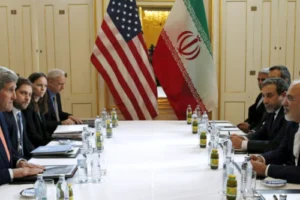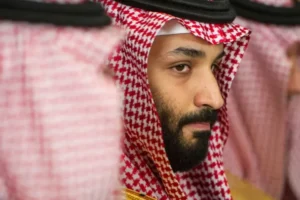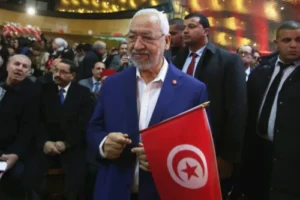
The National Interest Foundation Newsletter
Issue 180, February 24, 2023
Welcome to our NIF Newsletter. In this week’s headlines: we look into what happened to the JCPOA, investigate the harsher penalties that many citizens in Saudi Arabia are facing for criticizing the government, and analyze the recent detainment of the leader of the largest opposition party in Tunisia.
What Happened to the JCPOA?

An ongoing stalemate in negotiations has left the JCPOA in limbo. (Photo from Reuters)
The JCPOA Remains in Limbo as the Stalemate Between the United States and Iran Continues
In 2015, Iran, China, Russia, the United States, France, Germany, the United Kingdom, and the European Union signed the Joint Comprehensive Plan of Action (JCPOA), which aimed to restrict Iran’s nuclear program in exchange for sanctions relief. Unfortunately, the Trump administration unilaterally withdrew from the agreement in 2018 and imposed the toughest penalties yet, which remain in effect today. Iran began to exceed some of the deal’s limits in response to the US withdrawal and the reimposition of sanctions. This decision was highly controversial and has had severe repercussions for both the US and the international community. The restoration of the JCPOA has been facing ups and downs, yet neither side has been ready to call the agreement off for good. There has been no public indication of progress, and Western parties continue to encourage Iran to step up its cooperation with the International Atomic Energy Agency (IAEA). For months, there has been discussion about a possible visit by IAEA Director General Rafael Grossi to Tehran, as Iran continues to accuse the nuclear watchdog of being exploited as a “political instrument” by opponents of the nuclear agreement. Grossi, in the past, has described the current state of the nuclear deal as an “empty shell,” but has emphasized the importance of granting more inspection and monitoring access to verify the peacefulness of Iran’s nuclear program. According to Bloomberg, agency inspectors recently discovered uranium enriched to 84 percent in Iran, which is the highest amount ever detected in the country and is close to the 90 percent necessary for an atomic weapon. Iran, however, insists that it does not desire a nuclear weapon. The discovery of highly enriched uranium has raised concerns among Western powers, which have been trying to revive the nuclear deal that was abandoned by the US in 2018. The situation is complicated by the fact that Iran is currently in the midst of a presidential election campaign and massive protests. The country’s conservative politicians have been critical of the nuclear deal and of the IAEA’s monitoring activities. Nevertheless, the IAEA has stressed the importance of dialogue and cooperation to resolve the issues surrounding Iran’s nuclear program. The effects of these sanctions are also having a stifling impact on Iran’s economy.
Iran’s national currency has reached an all-time low, and food and other items prices continue to rise. Iran has been facing significant economic struggles due to a combination of factors, including international sanctions, internal economic mismanagement, and the COVID-19 pandemic. The recent devaluation of the national currency is a clear indicator of the severity of these economic challenges. The JCPOA, also known as the Iran nuclear deal, was seen as a way to lift international sanctions and revive the Iranian economy. The recent announcement of additional EU sanctions against Iran is likely to further exacerbate the country’s economic woes. The goal in doing this is to pressure the Iranian government to concede to a new deal, but this strategy has so far proven ineffective. Iran has been very resourceful in blunting the effects of the sanctions. In response to the depreciation of the national currency, the central bank governor announced the creation of a new currency and gold exchange hub to stabilize prices. However, it remains to be seen whether this measure will be effective in the long term.
The rising prices of basic goods such as meat and vegetables, as well as the government’s attempts to provide basic food goods at cheaper rates, are indicative of the impact of inflation on the country’s citizens. Overall, Iran’s economic struggles are likely to continue as long as international sanctions remain in place, and the country continues to face internal economic challenges. While the creation of a new currency and gold exchange hub may provide some temporary relief, a more comprehensive approach is needed to address the root causes of Iran’s economic difficulties. The JCPOA remains a topic of concern and could offer a potential path for lifting sanctions and revitalizing the Iranian economy, but its fate is uncertain in the face of ongoing political tensions.
The restoration of the Iran nuclear deal has been a tumultuous journey, marked by numerous highs and lows. The past year has been particularly challenging, with many reports of near collapses and supposed breakthroughs. While a final text was hashed out in September based on a European offer, it ultimately fell through due to a lack of commitment on both sides.
The stalemate that followed has been accompanied by significant changes both within and beyond Iran. Western powers have imposed several rounds of sanctions on top Iranian officials and organizations, alleging their involvement in supplying drones to Russia during the Ukrainian war. Iran denies any involvement and maintains that it sold drones to Russia months before the conflict began, asserting its opposition to the war. Large-scale protests have also broken out across Iran following the murder of Mahsa Amini, a 22-year-old woman, who died in police custody. Iran accused the West of orchestrating the unrest, while the West retaliated with a barrage of human rights sanctions in response to Tehran’s handling of the demonstrations. As the negotiations for the restoration of the Iran nuclear deal continue, these challenges are a reminder of the complex political dynamics at play.
The status of the talks surrounding the restoration of the JCPOA remains a topic of concern and speculation for many. Despite receiving backchannel signals for a potential deal, the US has stated that reinstating the agreement is not currently a priority. Iran has responded by accusing American officials of hypocrisy and inconsistency. Both sides have proposed their own versions of a “plan B” in the event of a breakdown in negotiations, sparking concerns of a potential military conflict. Thus far, there has been no public indication of progress in the discussions. Western powers are urging Iran to increase its cooperation with the International Atomic Energy Agency (IAEA) to allay fears of nuclear proliferation. In the midst of the negotiations, the US and Iran have also been discussing the exchange of inmates held on various charges. While the nuclear talks have been intertwined with this issue at times, it is possible that progress could be made on the prisoner exchange separately from the larger diplomatic efforts. As the world watches and waits for progress to be made in the JCPOA discussions, all parties must remain committed to finding a mutually beneficial solution that will prevent further escalation and promote regional stability. Any misstep in these delicate negotiations could have dire consequences for all involved.
Saudi Penalties Getting Harsher

Penalties for criticizing the Saudi government have been getting harsher. (Photo from AP)
Saudi Dissidents Continue to Face Harsher Penalties for Criticizing the Government
Saudi Arabia has long been known for its harsh punishments and oppressive policies, but recent events have shown that the situation is only getting worse. Those who dare to criticize the government now face much heavier consequences than before, with charges based on even minor Twitter remarks resulting in jail terms ranging from 15 to 45 years. One such example of these extreme punishments is Mr. Almadi, a retired project manager and Saudi-American dual citizen residing in Florida. Despite being an ordinary citizen with no activist leanings, his tweets critical of the Saudi government were used as evidence against him when he was detained while on vacation in Saudi Arabia. He was ultimately sentenced to 19 years in jail, a punishment that his family says is completely unwarranted.
The effects of Saudi Arabia’s oppression are felt far beyond just those who are directly targeted. The country has been undergoing seismic shifts in recent years, with ambitious plans to diversify the economy and lift social and religious prohibitions that were long considered oppressive. While these changes are welcome, they are also being used as a way to silence criticism of the government. As one Saudi official told The New York Times, the government is examining ways to improve human rights and the judiciary system. However, the reality is that Saudi Arabia maintains a zero-tolerance stance on dissent and anyone who dares to speak out risks being punished severely. It is more likely that they are using to promise of reform to blunt some of the criticism they receive from the international community for their actions. The tactics employed by the Saudi Arabian government have a chilling effect on those who criticize the government and can discourage others from speaking out. When people see that others are being punished excessively for even minor criticism of the government, they may be less likely to take the risk of speaking out themselves.
This can lead to a climate of fear and self-censorship, which we are feeling from those wanting to speak out for justice. People are hesitant to express their opinions or even ask questions about government policies. This lack of free conversation can make holding the government responsible and addressing concerns difficult. Furthermore, when people are silenced in this way, it can create a sense of isolation and helplessness. Those who the government has targeted may feel that they have no recourse or any way to fight back against the injustice they have experienced, just like we have seen in multiple instances as of late, including that of Mr. Almadi. This often leads to feelings of frustration, anger, and despair. Ultimately, the silencing of critics by the Saudi Arabian government is not only a violation of their fundamental human rights, but it also has a negative impact on the country as a whole.
The Saudi Arabian government’s oppressive policies have been going on for too long, and it is time for the international community to take action. The world cannot sit idly by while people are being silenced and jailed for expressing their opinions, a fundamental human right. The Saudi government’s actions are not only a violation of their citizens’ basic rights but are also a clear attempt to suppress dissent and criticism. By turning a blind eye to this oppression, the international community is enabling the Saudi government to continue these abusive practices with impunity. This not only harms the citizens of Saudi Arabia, but it also sends a message to other governments that such behavior is acceptable. If the United States wants to promote democracy and human rights around the world, we must take a strong stand against this kind of oppression. The international community must act to pressure the Saudi government to change its policies and respect the basic human rights of its citizens. Countries that have close ties with Saudi Arabia, such as the United States, must use their influence to push for change. One way in which the U.S. can enact its influence is to end, or at the very least put conditions on, its arms sales to Saudi Arabia. It’s time for the international community to recognize that Saudi Arabia’s oppressive policies are not just an internal matter, but a global concern. We cannot ignore the abuse of power and violation of basic human rights that are taking place in Saudi Arabia. We must take action to protect the rights of all people, including critics of the government. The world must unite to ensure that the voices of those who speak out against oppression are heard and that the Saudi government is held accountable for its actions.
Crackdown in Tunisia

Rached Ghannouchi, pictured here, was summoned for questioning. (Photo from Reuters)
Saied’s Crackdown on Critics Intensifies in Tunisia
Tunisia, a country that was once lauded for its successful transition to democratic governance, is now facing a grave threat to its political freedoms and human rights. President Kais Saied’s recent crackdown on dissent and the opposition has raised concerns about the sustainability of these practices and the future of Tunisia’s democratic system.
The recent summoning of Rached Ghannouchi, the leader of the largest opposition party in Tunisia, is just one example of the ongoing repression of political rights and free speech. President Saied’s practices have caused instability and uncertainty for Tunisia’s democracy in several ways. First and foremost, he has repeatedly taken unilateral actions to centralize power and limit the power of other branches of government, including the judiciary and the parliament. In 2021, he suspended the parliament, where the largest opposition party held the majority of seats. He also dissolved multiple judicial watchdog groups. This move was widely seen as a “constitutional coup,” and it has led to ongoing political and economic crises in the country. Since then, he has ruled by decree and pushed through a new constitution that enshrines his one-man rule. Saied claims his goal is aimed at preserving Tunisia from chaos, but they have been met with widespread condemnation from both domestic and international observers. Furthermore, President Saied has been accused of using the judiciary to target political opponents, including opposition leaders like Rached Ghannouchi. Ghannouchi, the leader of the country’s largest opposition party, has been detained and questioned multiple times on politically motivated charges, including money laundering and incitement to violence. Many critics see these actions as an attempt to silence dissent and limit free expression in the country. The recent wave of arrests and detentions targeting President Saied’s detractors has been widely condemned by human rights organizations and opposition leaders. The Union Générale Tunisienne du Travail (UGTT), one of the most powerful labor unions in the country, has accused the government of carrying out arbitrary detentions to “stifle voices.” The opposition has also criticized President Saied’s actions, accusing him of aiming to repress political dissent and limit free expression. Overall, President Saied’s actions have eroded Tunisia’s democratic institutions and created a climate of fear and uncertainty in the country. Without a robust system of checks and balances, the country’s political stability and economic growth are at risk, and the ability of its citizens to exercise their rights and freedoms is severely curtailed.
The recent events in Tunisia have been alarming for those who value democracy and human rights. The government’s crackdown on dissent and opposition leaders, including the detention of Rached Ghannouchi, shows a clear effort to suppress opposition and curtail free expression. This is a dangerous course of action that ultimately threatens the country’s democratic gains. The timing of Ghannouchi’s detainments and questioning about money laundering and incitement to violence, charges that his supporters claim are politically motivated, only adds to the sense that the government is trying to silence its opponents. These arrests often only target opponents of the government. The government’s actions have been widely condemned by Tunisian opposition leaders and civil society organizations, including UGTT. The country’s democratic progress is under severe threat. The government may argue that its measures are aimed at preserving stability, but the reality is that repressing political dissent and limiting free expression is unsustainable in the long term. These tactics may work in the short term, but they will only serve to further undermine Tunisia’s fragile democratic system. Tunisia needs a genuine commitment to democracy and human rights, not just the veneer of democratic governance. Steps need to be taken to reverse Saied’s repressive policies. The international community must also pay attention to what is happening in Tunisia and support those who are fighting for their political rights and freedoms. Tunisia’s democratic success is too important and cannot be sacrificed in the name of short-term stability. Tunisia has made significant progress since its 2011 revolution, and its democratic growth has been an inspiration to others in the region and across the globe. Action must be taken before these democratic gains are reversed.
